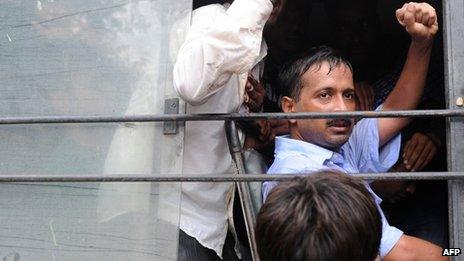India activist Arvind Kejriwal launches anti-corruption party
- Published

Arvind Kejriwal is a leading anti-corruption campaigner
A leading campaigner in India has announced the establishment of a political party to fight corruption.
Arvind Kejriwal said his party would fight against the culture of "bribe-taking" and pledged to contest the next general elections due in 2014.
The launch of the party comes on a day when India is observing Mahatma Gandhi's birth anniversary.
Last month, anti-corruption campaigner Anna Hazare parted ways with Mr Kejriwal over plans to enter politics.
Mr Hazare has said he prefers "sacred" agitation over politics, "which is full of dirt".
Mr Kejriwal has said his group would continue to "seek Mr Hazare's blessings" despite the rift.
'Party of the people'
"The country is being sold and all parties are guilty. We need to clean up the system," Mr Kejriwal told his supporters at the launch of the party in the capital, Delhi, on Tuesday.
"This is not my party. This is a party of the people of this country.
"I do not know whether we will win or lose, but if I do not fight today my children will accuse me of wasting an opportunity," he said.
Mr Kejriwal said they would announce the name of their party on 26 November.
Correspondents say the new party aims to tap into the public anger against several high-profile corruption scandals which have come to light in the last few months.
Mr Kejriwal is a former bureaucrat who won the Ramon Magsaysay award in 2006 for social work and initiatives to fight corruption.
Two years ago, the 44-year-old campaigner set up a group called India Against Corruption aimed at putting pressure on the government to bring about tough anti-corruption laws. Mr Hazare led the movement through a series of hunger strikes and protests.
The two campaigners met in Delhi ahead of Tuesday's announcement and Mr Kejriwal said: "We have no fight between us. He himself has said the goal is [the] same though the paths are different."
Both the campaigners are demanding the appointment of an independent ombudsman to prosecute politicians and civil servants suspected of corruption.
The idea was passed by the lower house of parliament in the form of the Lokpal bill in December 2011.
But the upper house adjourned amid chaos without passing the controversial legislation.
A 12-day fast by Mr Hazare a year ago almost brought the government to its knees and led to the introduction of the Lokpal bill in parliament.
Mr Hazare started another hunger strike in December but called it off and threatened instead to launch a campaign of civil disobedience that would fill the country's jails.
- Published18 April 2012
- Published18 March 2011
- Published30 December 2011
- Published3 December 2011
- Published1 December 2011